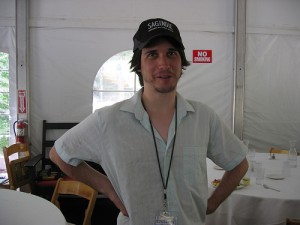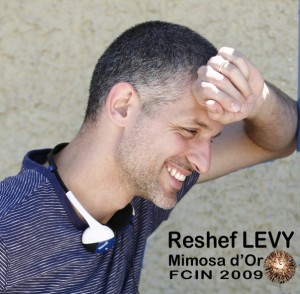Jewish Film Festival Diary, Week 2
The recent stream of successful Israeli features—The Band’s Visit, Waltz with Bashir, and Beaufort, to name the most obvious—has significantly raised the bar for Israeli filmmakers. No longer can we consider oursleves satisfied by a well-made, albeit Israeli film. Rather, inclined moviegoers are lead to expect extraordinary cinematic experiences, of the kind that an increasing number of Israeli films simply cannot provide.
The best example is Sharon Maymon and Erez Tadmor’s brand new A Matter of Size. The success of Tadmor’s previous film, 2007’s Strangers (which he co-directed with Guy Nattiv) created tremendous expectations for his next project. Such hopes were boosted by the fact that A Matter of Size was selected, among others, for the Tribeca Film Festival and as the opener of this year’s Jerusalem Film Festival. Unfortunately, such high profile festival endorsements have done the film a disservice.
Maymon and Tadmor’s film weaves two familiar comedic genres that are increasingly brought together in American films: martial arts, and cultural encounters between East and West. Set in contemporary blue collar Israel, the film centers around Herzl, a 340-pound 35-year-old chef who still lives with his mother. At the beginning of A Matter of Size, Herzl is dismissed from the local health club for gaining weight. At the same time, the cook quits his job at a fancy restaurant after being told he is not “representative enough” to serve at the bar, and placed in the kitchen.
Herzl finds new employment as a dishwasher at a Japanese restaurant, where his coworkers convince him that he would be a perfect sumo fighter, explaining that the owner of the restaurant was an important sumo referee back in Japan. Herzl now has a double mission: to convince his overweight friends to quit the health club and jointly establish a sumo club to celebrate their obesity, and to convince his boss to train the staff in the art of sumo combat.
The most successful aspect of A Matter of Size is its use of visual gags that build on the excessive weight of the film’s protagonists. Dressed in bright red loincloths, it is impossible to avoid noticing them on the main street of their working class town. Between their obesity, and the alien character of their clothing, they are, quite literally, exposed. The question is to what end, apart from the sheer spectacle of encountering corpulent Israelis in Japanese wrestling drag.
A Matter of Size does not ask what it means to be (physically) set apart and discriminated against by a society that places such a premium on weight. Nor does it adequately bring to the surface how this sense of apartness is related to the desire to shock, to celebrate one’s difference and frame it in such a deliberately exotic manner. Likewise, the film does not ask what is at stake in having Israelis stage such an encounter between the Orient and the Occident, and how this might say something about their self-perception, as aliens.
If that doesn’t strike you as problematic, you’ll find Reshef Levi’s Lost Islands even more troubling. A box office hit in Israel in 2008, Lost Islands presents a stellar cast of some of the country’s best actors, including Oshri Cohen and Michael Moshonov (who won the Israeli Film Academy Award for his performance) in the lead roles, and Orly Silbersatz Banai and Shmil Ben Ari (who also won the Israeli Academy Award for his performance) as supporting cast. The film tells the story of the Levi family, residents of the upper middle class town of Kfar Sava in the early 1980s.
The Levi family is anything but happy. The father is a case study in hipocrisy, advising the his five children of the importance of pursuing their dreams, all the while forcing his own upon them. The mother, equally dysfunctional, rules the Levy household with an iron fist, openly favoring one of their twin sons, Ofer, over his brother, Erez. High school seniors about to enter the army, the boys compete with and support each other simultaneously, as they pursue their first sexual encounters, paying an obligatory visit to a hooker, falling in love with the same girl at school. When the father has an accident and loses the use of his legs and, consequently, his job, the family’s troubled dynamics rise to the surface, threatening its very existence.
Ofer and Erez now have to consider their roles within the family as well as within society as a whole. Coupled with the political and military turmoil that Israeli underwent in the wake of the first Lebanon War, (which breaks out shortly after the twins enlist in the army), their adolescent bubble completely explodes. The course of the plot suggests that the film was intended to explore the uneasy, even tragic dimensions hidden beneath the glistering surface of a typical coming of age narrative, much along the lines of classic Hollywood films such as American Graffiti. Herein lies the film’s failure.
For one thing, the repeated references to the social and political events in Israel during these years seem completely superficial. Indeed, this is not a film about how politics and world affairs intrude on private lives, irretrievably changing them, as so many Vietnam films narrate. Similarly, this is not a film about how individuals resist the intrusion of the outside world in an endeavor to protect their private lives. Indeed, despite constant references, the role that politics plays in shaping the characters’ lives remains completely unexplained. Even the Lebanon War, which ostensibly plays a central role in the plot, is ultimately redundant. The impact it has on the characters could have been equally produced by any number of events.
More damning, however, is the fact that Lost Islands refuses to take seriously the guilt that haunts Erez throughout the second part of the film, in his relationship with both his father and his twin brother. In fact, it ultimately suggests that this could be easily alleviated. The resolution that the film ultimately provides - and which I will withhold for those who have not seen it yet - is completely unconvincing within the psychological and social-political contexts that Lost Islands sets for itself.
Eran Merav’s film Zion and His Brother is arguably the most successful of all of these features, even though it is the least polished. Like Lost Islands, it follows a loaded relationship between two brothers. Yet, this time, the story takes place in a working–class suburb of Haifa, which recent Israeli films, most notoriously Nir Bergman’s 2002 Broken Wings, have turned into a privileged locus of class dramas in Israel.
Eran MeravEran MeravZion is a 14 year-old high school student who relies on his older brother Meir for physical and emotional support and protection in their rough neighborhood. However, Zion also constantly competes with him. Both Zion and Meir experience emotional turmoil when their divorced mother’s relationship with her current suitor seems to get ever more serious, and the suitor invites the mother and the children to move with him. Meir—an angry young man who cannot hold down a job—turns ever more violent. When that aggression is turned unchecked against one of Zion’s classmates, at Zion’s instigation, a tragedy ensues. Zion, haunted by guilt feelings, is now prompted to reevaluate the role his brother plays in his life.
The director makes the most of the economically depressed setting of his story and of the exposed, ugly concrete structures in which they live. Indeed, this urban setting becomes the fifth character in Merav’s chamber drama. Zion and His Brother likewise enjoys strong performances from Reuven Badalov as Zion and Ofer Hayun as Meir. Surprisingly, the film’s more experienced actors, Ronit Elkabetz (playing Zion’s mother) and Tzahi Grad, her suitor, are less convincing. Elkabetz in particular seems to rely on stock gestures she developed in previous roles as a suffering, emotionally volatile, poverty-stricken woman (To Take a Wife [2004] and Shiva [2008]) and brings little new to the character.
Merav’s film is far from perfect. It fails to fully explore the nature of the guilt feelings that are so crucial in shaping Zion’s relationship with his brother and, indeed, ultimately disappear from the plot. Be that as it may, Merav does not fall into the trap of easy resolution of the conflicts he so painfully portrays. In doing so, he remains true to his characters’ psychology. This is more than can be said about A Matter of Size and Lost Islands.
Click here to read the first installment of Shai Ginsburg’s coverage of the 2009 San Francisco Jewish Film Festival.
![[the current issue of ZEEK]](../../image/2/100/0/5/uploads/leftistethicistgraphic-52842c6a.png)
- 5000 Pages of Zeek
- Founded in 2001, Zeek was the first Jewish online magazine, and we have over 5000 pages online to prove it, all available free of charge. Read more in the Archive.
More articles by
Shai Ginsburg
More articles in
Arts and Culture
- Euphoria, Curiosity, Exile & the Ongoing Journey of a Hasidic Rebel: A Q & A with Shulem Deen
- Poet Q, Poet A: Jews Are Funny! Six Poets on Jewish Humor, Poetry & Activism and Survival
- Tackling Hate Speech With Textiles: Robin Atlas in New York for Tu B’Shvat
- Fiction: Angels Out of America
- When Is an Acceptance Speech Really a Speech About Acceptance?




